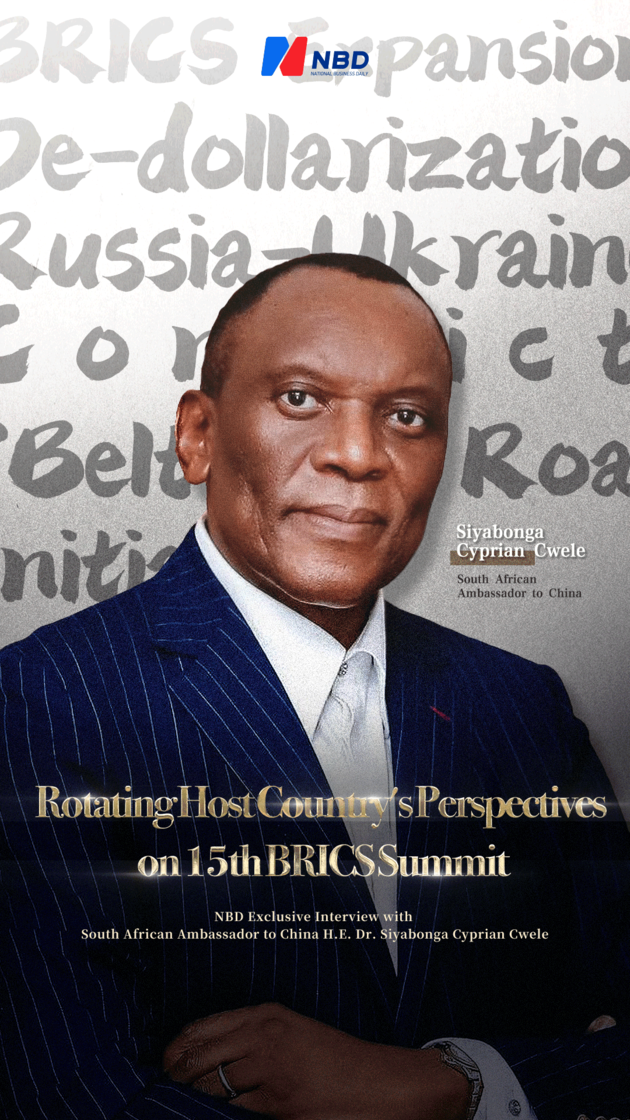
The 15th BRICS Summit, the first in-person summit of BRICS countries' leaders since the COVID-19 pandemic, is to be held from August 22nd to 24th in Johannesburg, South Africa.
South Africa's Minister of International Relations and Cooperation Naledi Pandor said on August 8 that South Africa is ready, according to Xinhua.
67 leaders from African countries and the Global South have been invited to attend the BRICS-Africa Outreach and BRICS Plus Dialogue, and about 20 dignitaries from the African Union Commission, the United Nations and regional economic blocs have been invited for a meeting to be held before the summit, added Pandor.
Data from the World Bank shows that in 2022, the BRICS bloc has a combined GDP of over 25.92 trillion U.S. dollars in 2022, accounting for 25.8% of the global GDP. It is reported that more than 40 countries have shown an interest in joining the BRICS bloc, with 22 having formally applied for BRICS membership. Currently, BRICS countries include China, Russia, India, Brazil, and South Africa.
On the eve of the Summit, NBD had an exclusive interview with the South African Ambassador to China H.E. Dr. Siyabonga Cyprian Cwele who shared his views on the economic development of BRICS countries in the post-pandemic era, "de-dollarization", BRICS expansion, Russia-Ukraine conflict, and the impact of the Belt and Road Initiative.
On economy: focusing on economic recovery and opening supply chain
NBD: This summit will be the first face-to-face meeting of BRICS leaders since the outbreak of the COVID-19 pandemic. In the post-pandemic era, what role do you think BRICS countries will play in promoting global economic recovery?
Cwele: In terms of the challenge of economic recovery, every country basically needs a collective effort. None of the countries can really act alone and has an impact. But BRICS countries are quite significant in terms of the global economy, in terms of the population we have, and in terms of their contribution. More than 20% of global trade comes from these five countries because we coordinate the economic issues and that will have quite a positive impact.
The key focus for BRICS will be economic recovery. As BRICS countries, how do we coordinate our economies so that we can expedite the economic recovery? How do we make sure that the global supply chains remain open? There are quite a number of activities even within BRICS itself. Even during the COVID, for instance, the trade between South Africa and China continues to grow because we took a stance that we should keep the global supply chains open.

In addition, the impact of some forums cannot be ignored. For instance, the BRICS Women's Leadership Forum. They collaborate among BRICS countries and have viable projects among themselves, which contributes to our collective economic growth.
And the upcoming 15th BRICS Summit, the BRICS Business Council will issue a report on collectively coordinating their efforts toward a global economic recovery. That's very important. Because there are quite a number of significant companies and global companies that belong to these five nations. So we'll be looking very closely on the report because they've been working very hard since last year. It is the first time now they are actually having face-to-face meetings.
It's different when people meet online from when they meet in person. Different countries have different policies. But it is our shared vision —— to have an inclusive transform, global financial system, and then transform the governance system —— that binds us. BRICS were coordinating not for ourselves, but for the interests of a bigger global public good. That's why the other developing economy and emerging economies are having a very keen interest in this. So we hope that the deliberations which have been happening over the last year, particularly from the BRICS, will contribute to this global recovery and resilience.
On de-dollarization: not against dollar, but unnecessary externality
NBD: The BRICS nations have always been advocates of multilateralism. So what specific measures have we taken to de-dollarization?
Cwele: True multilateralism is very important. We are not really pushing for de-dollarization, we are not against the dollar.
But there've been challenges of making sure that we diversify the currencies for global trade, not only because of these shocks of unilateral actions, like sanctions, which then have an impact on people who are not part of the sanctions. We are using our own currencies to trade with each other and develop them to a strain that they can be attractive to other nations to utilize our currencies.
Secondly, we are looking at the new forms of digital currencies, something they called blockchain or whatever. We're looking into those. There are studies that are being done. If they can successively facilitate these cross-border transactions, we will be looking forward to the report on the new and emerging digital currencies.
So it's not just a focus on "against the dollar", but to make sure that we are pushing ourselves against unnecessary externality, because we're having this sort of tension in the world that they don't have a global impact on the global economy. If you come up with successful digital currencies, most countries will adopt these. Most countries are looking into these things. But I think the BRICS countries are in the lead of this.
Those are the measures we've taken to cushion these unnecessary externality, not for ourselves, but for the world.
On BRICS expansion: no objection from members but clear criteria needed
NBD: We have noticed that several countries have applied to join the BRICS. The expansion of the BRICS seems to be inevitable. What is South Africa’s attitude and expectation on this?
Cwele: The matter of BRICS expansion is not a new thing for us. From its conception, it was never conceptualized. It is not an exclusive club.
The second point is that we are one of the first beneficiaries that were invited to join the summit of the BRICS. We are very grateful that China plays a leading role in this, as well as to other BRICS countries at that time for accepting South Africa.
Well, we were invited in 2010 to be a member of the BRICS. So we are the first beneficiary. We know the benefits of it. The figures show clearly that after joining the BRICS, the trade with BRICS countries increase significantly compared to the level they were traded before, particularly with China. I think that our trade with China increased exponentially. China started to be our largest trading partner in 2009. But since then, it has been by far the leading trading partner of South Africa. Since joining the BRICS in 2010, we became the largest trading partner of China year after year.
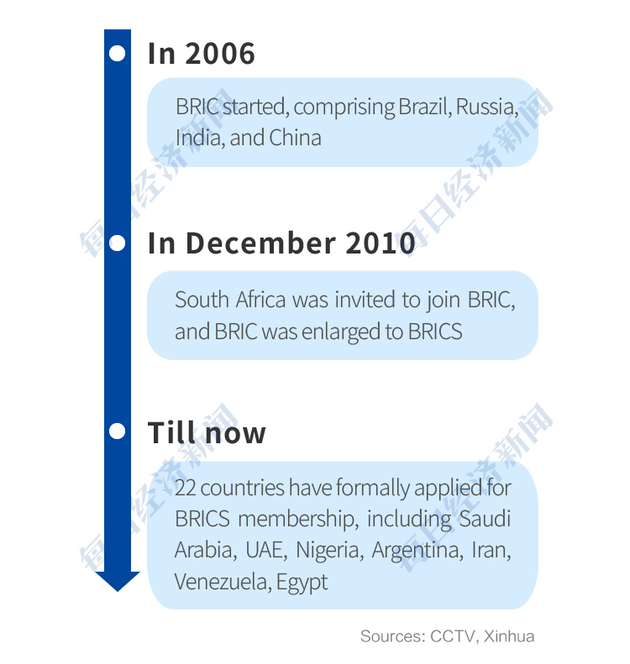
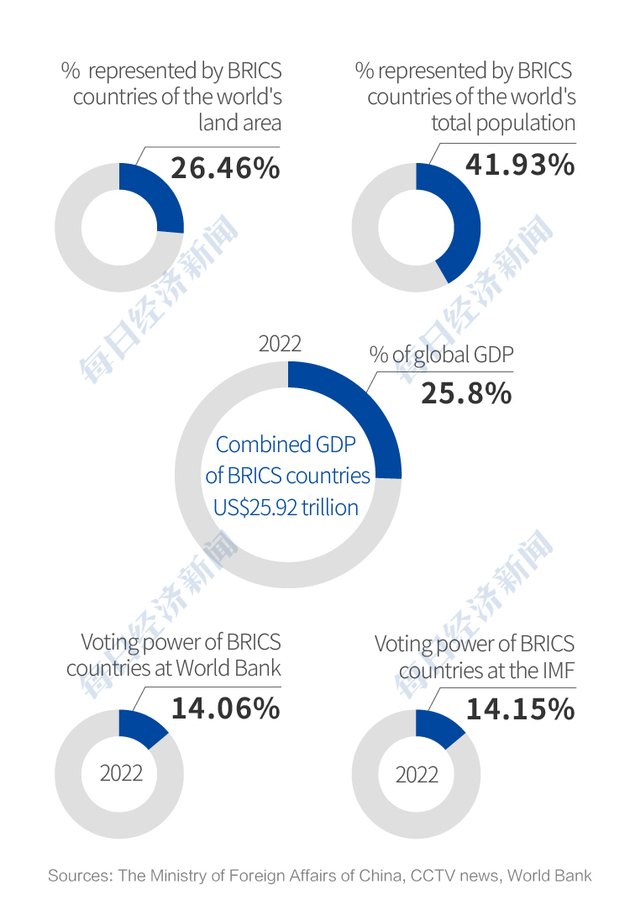
So the discussions on the expansion started around 2016. At the 2018 leaders' summit, senior officials felt that it was too early. Let's first do some internal consolidation among ourselves. Once things are more stable among ourselves and then we will bring up this discussion.
Our senior officials, the BRICS shepherds, in particular, were looking at the criteria and the form. Why was this so important? There must be clear criteria on why they chose this one, this time, not other ones. Then South Africa has been really pushing this since the beginning of this year.
More emerging economies have been showing keen interest to join in. Countries were just announcing that they want to join. Others are sending us letters. However, we're still discussing, once the discussions are concluded, the leaders will be able to take decisions and consider the interest.
So that has been going well so far. We have got full confidence that if we have enough time, we will reach a consensus. I'm quite confident that no one among all the BRICS countries are against expansion. I believe significant progress will be reported at this conference because there's a keen interest from so many countries.
I would like to emphasize that some people think the BRICS nations may be competing with other organizations. It is noticeable that we are also members of the G20. Now if some people are saying we're competing with G7, we have got no intention to compete with G7. BRICS partnership is a partnership for development. It's about inclusive development, is about shared growth, is about multilateralism and so on. So that's why it is appealing. It's about what people are being confronted with in all these developing countries.
On Russia-Ukraine conflict: global supply chain affected
NBD: There is no signs of a resolution to the conflict between Russia and Ukraine. So how do you think the BRICS should maintain our own interests and development while contributing to the reform of the global governance system?
Cwele: As I said, we'll coordinate our economic activities to cushion ourselves from this type of shock, not only focusing on the European conflict in terms of Ukraine, we are also looking at other conflicts.
And I remember we had joint exercises of our navies in South Africa earlier this year. Some people were discussing these things if we are preparing to help Russia in the conflict with Ukraine, which is not true. That exercise is to protect the trade routes from pirates. So it is in our economic interest to reduce the number of pirates along these global shipping routes. That's the main thing we do.
Secondly, BRICS nations are looking for peace. We know that we benefit when peace develops. War pulls us back. So that's why we're also helping to provide solutions to conflict. For instance, in Africa, there are still some conflicts, although they are becoming less and less, in the upcoming meeting, African leaders will come up with practical cooperation to reduce the conflict. So this is in our interests to do so. But it's also in the public good.
In the conflict in Europe, who is talking about peace? We have not sent anything which escalated the conflict. The African Union has come up with its peace proposal. We found there is no rejection of the plan. The challenge now we face is how do we kick-start the process.
So, we are very patient and consistent right from the beginning. Wherever the conflict is, it will impact the global supply chains. For instance, the European conflict got a huge impact on food and fuel inflation, especially for countries like South Africa that are dependent on imports. Some of the developing countries reduced imports of grain. What are we doing to cushion ourselves? South Africa has a lot of projects helping these least developed countries in Africa to stimulate their agriculture.
But the most important is that we should learn from the conflict.
On Belt and Road Initiative: Connecting African countries with capital and expertise
NBD: We notice that South Africa is the first African country that has joined Belt and Road cooperation. So what is the positive impact of the Belt and Road Initiative on BRICS and Africa's development?
Cwele: We are very happy that this year we're celebrating the 10th anniversary of the Belt and Road Initiative. It's a very important initiative. We were one of the first African countries to join the initiative in 2015. And from our perspective, we're seeing this as the platform for mutual exchange practices, for instance, in terms of how we handle the exchanges of goods, capital, technology, and also people-to-people exchanges.
The economy and economic infrastructure are our top priorities. Looking from the African perspective, it has had a very positive impact.
The African continent has got its own agenda. By the time the African Union celebrates its centenary in 2063, we should really come out of poverty, and become an advanced and more integrated economy.
Most of the colonized countries are in Africa and we find ourselves of that colonialism. The infrastructure was mainly built to extract resources. Roads and rails are just stretching from the extraction point to the port. We're transporting these raw materials. So we didn't even have infrastructure which is connecting the country. Now we're building that type of infrastructure -- roads, rails, and ports, which are critical. And China played a very important role.
Through this Belt and Road Initiative, most of the funding has modernized their planning and building and minimized the fiscal squalor in the city centers. Many countries now have a number of beneficial projects which people can see - rail, ports, these are the things which are happening through the Belt and Road Initiative. It's not like something they theorize and they can see the benefit.
So the Chinese corporations now are helping us with technologies to repair the current fleet of power generation to reduce emissions, so that we can expand their lifespan a little bit while we are building other clean energy projects.
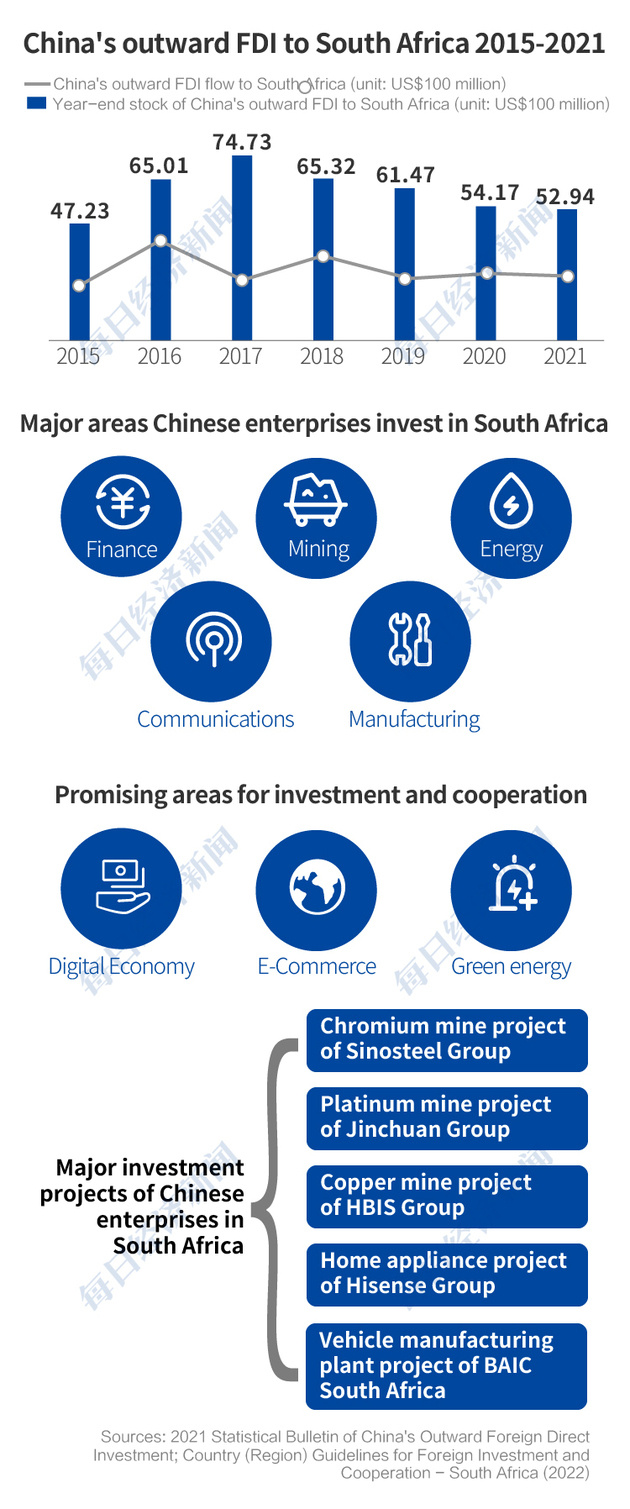
The biggest wind farms and solar farms are also built by Chinese corporations. The biggest wind farm in a small town had a positive, very positive impact in that community, that town, and people. It provides not only stable electricity but also social responsibility. They had schools refurbished and so on. And people are very happy.
There are many of these projects. We're a mining country. Chinese corporations involved in mining help generate electricity with PV panels and these other technologies. They are also collaborating with our telecom operators to roll out 5G services. These Chinese companies were at the forefront of this.

Sidelights | "Tolerance, sharing, and multilateralism", the BRICS spirit embodied in the eyes of the Ambassador
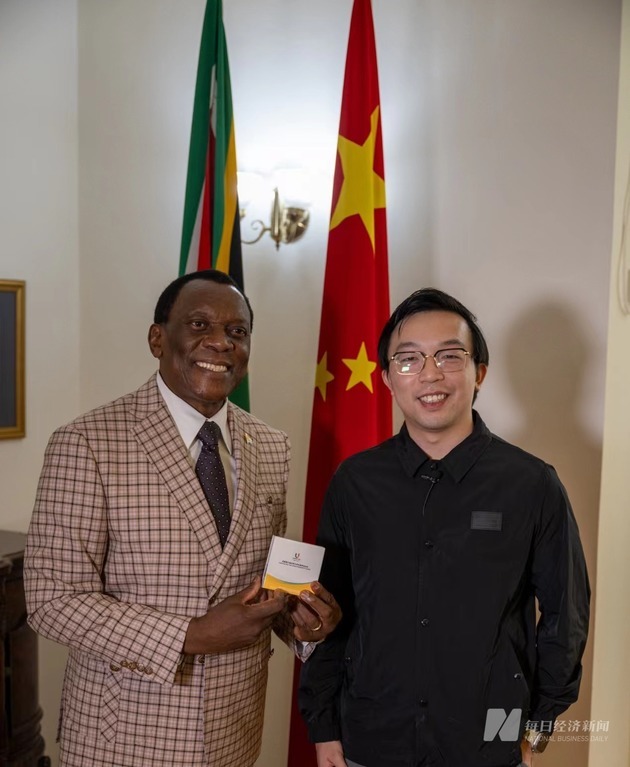
South African Ambassador to China H.E. Dr. Siyabonga Cyprian Cwele (left) holds the souvenir of Chengdu 2021 FISU World University Games. Photo/Han Yang (NBD)
Amid the vibrant canvas of the 31st summer edition of the FISU World University Games held in Chengdu, the South African delegation emerged as a beacon of excellence, securing the top position among African nations with an impressive haul of 20 medals. A battalion of over 100 South African athletes, their brows adorned with sweat and their hearts alight with achievement, not only garnered honors but also showcased the indomitable youthfulness and vitality that courses through their nation.
Stepping out of the stadium, a serendipitous encounter awaited me: I got the rare opportunity to have a face-to-face interview with H.E. Dr. Siyabonga Cyprian Cwele, South Africa's ambassador to China.
"Panda guy!" The warm and cheerful greeting of the ambassador on the day of the interview instantly livened up the atmosphere, and bridged the geographical space between China and South Africa.
During our conversation, Ambassador Cwele artfully weaved together the intricate threads of cooperative vision and challenges within the BRICS group. His words flowed forth like a refreshing stream, laced with wisdom, and a sprinkle of humor. With candid insight, he illuminated the multifaceted impact of the far-reaching "Belt and Road" initiative on the African continent. In his eloquence, I witnessed not only South Africa's steadfastness as the rotating host country of the BRICS Summit but also the magnetic allure and sweeping influence of the BRICS mechanism.
The Ambassador's discourse was intricately adorned with the motifs of "inclusive development," "shared growth," and "multilateralism". These concepts weren't merely the cornerstones of BRICS aspirations but rather the guiding stars of humanity's march forward.
As I left the chamber, my eyes fell upon a photograph of Nelson Mandela, the revered "father of South Africa", gracing the embassy's lobby. A wave of emotions surged within me, as his legacy of inclusivity and reconciliatory wisdom came alive once more. Ambassador Cwele encapsulated this sentiment perfectly when he stated, "Different countries have different policies, what really binds us as a BRICS here is our shared vision to have an inclusive transform, global financial system, and then transform governance system."
With anticipation building like the crescendo of a symphony, the 15th BRICS Summit, scheduled from August 22nd to 24th in South Africa, emerges as a focal point of global interest. This forthcoming gathering isn't merely a diplomatic event; it's a convergence of minds, a nexus of ideas, and a source of collective strength that will infuse sagacity and vigor into the ongoing pursuits of global economic resurgence and governance reform.


 川公网安备 51019002001991号
川公网安备 51019002001991号





